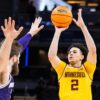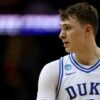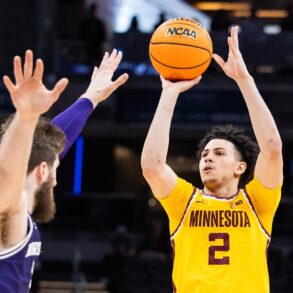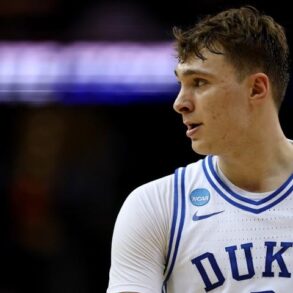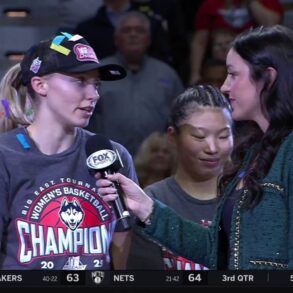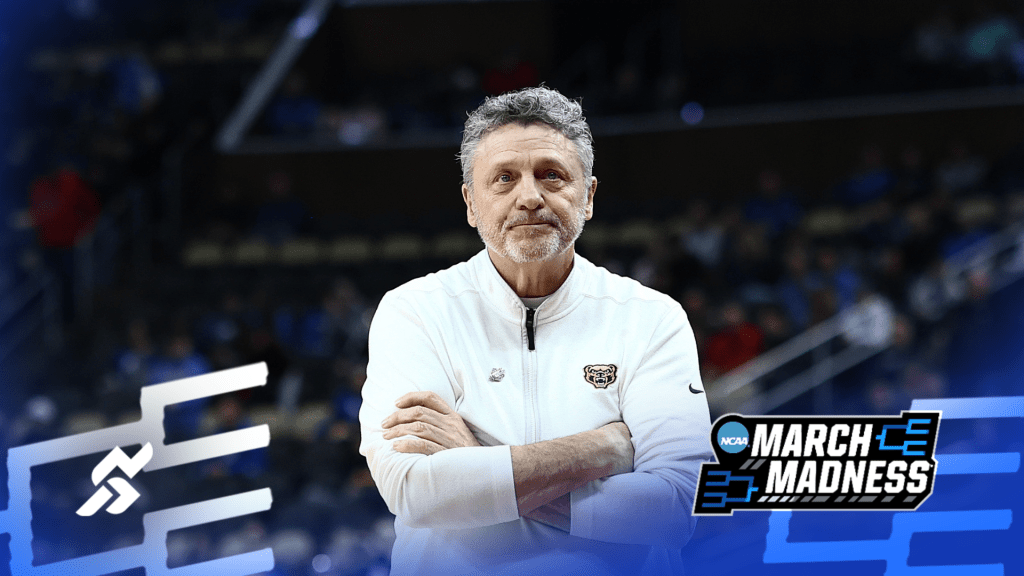
This time last year, Oakland men’s basketball coach Greg Kampe had just experienced what he called “the greatest win I’ve ever been a part of” in his four-decade tenure leading the program. His No. 14-seeded Golden Grizzlies shocked the basketball world, pulling off an upset over John Calipari’s No. 3-seeded Kentucky in the first round of the NCAA tournament.
The game was highlighted by a spectacular performance from Oakland transfer guard Jack Gohlke, who knocked down 10 3-pointers, propelling the team’s sixth man into the national spotlight with NIL deals and newfound fame.
“We’re not a Cinderella,” Gohlke boldly declared in a post-game interview with CBS, his arm around Kampe, who has coached Oakland since Ronald Reagan’s first term.
If this were a Hollywood movie, the story might have ended there, but reality had other plans. In the second round of the tournament, Oakland fell short against NC State in a six-point defeat. Gohlke went undrafted in the 2024 NBA Draft, and Kampe signed a contract extension with Oakland, which might well be his last.
Sportico will be publishing daily stories about March Madness throughout the men’s and women’s tournaments. To receive them in your inbox daily, sign up here via Club Sportico.
Kampe reflected on his post-Cinderella experience in recent interviews with Sportico, recalling that “not one person, no [other] university called to offer me a job.”
A year after experiencing his greatest victory, he was hitting the recruiting trail to refill the roster of a program that, more or less, was in much the same position as before it beat Kentucky.
Since Syracuse’s Jim Boeheim retired in March 2023, Kampe became the longest-tenured head men’s basketball coach in Division I, and by a considerable margin. As such, his experience is both unique and relevant to the many non-power conference coaches who have looked to the NCAA tournament as a potential springboard to elevate their programs or careers. The lasting benefits of March success have become increasingly fleeting in recent years—especially for those who choose to stay put.
For Kampe, there was no choice. By the time he finally found the glass slipper, there were no suitors.
“Probably, because they think I’m old,” the 69-year-old said. “Maybe they see I have been here for 40 years and think I won’t leave and don’t ask.”
So, he signed a two-year contract extension last June that carries through the end of the 2028-29 academic year and reportedly pays about $400,000 annually, including bonuses.
While other programs may not have been knocking down Kampe’s door, a number of college basketball players certainly were for a time. However, most of those conversations ultimately went nowhere.
“Every 6-foot-5 white guy in the country called us after they saw Jack Gohlke,” Kampe said. “But when I told them the number I could pay them, it was, ‘Coach, thanks, but I can get more elsewhere.’ What that game did was shine a light on Oakland, or how we played, but in essence, it didn’t help. I had a kid who called me and wanted $200,000, and he was a really good player, but we don’t have that type of payroll for our players.”
Oakland has agreed to participate in next year’s athlete revenue-sharing provisions, part of the House v. NCAA settlement, though the school has yet to decide how much it will distribute. Kampe said he was able to raise a “significant amount of [NIL] money” by Oakland’s standards, but even that spike feels short-lived.
“Will I be able to do it again next year?” Kampe said. “Probably not, because we didn’t beat Kentucky this year.”
As this past season unfolded, the 16-18 Golden Grizzlies were again on the cusp of another March Madness appearance. But those dreams were dashed with an overtime loss to Robert Morris in the Horizon League tournament semifinals.
“If you had the greatest banana pudding you’ve ever eaten and now you see other people eating it,” he said last week, reflecting on what it was like to watch this year’s NCAA tournament from the (dis)comfort of home.
On Thursday night, Kampe’s former four-year starter Trey Townsend, the 2024 Horizon League Player of the Year, will suit up for Arizona in its Sweet 16 game against Duke. Two other one-time Oakland transfers, Chris Conway (Washington) and Micah Parrish (Ohio State), were key contributors to power-conference programs this year. According to Kampe, the trio of ex-Grizzlies earned a combined $1.2 million in NIL compensation this year.
“I have three guys playing in the Power 5 this year who would have been on my team if the [transfer] portal didn’t happen—imagine what we could have done in the old days,” Kampe said. “Think about what this team could have been. Now, I am sounding bitter, which I don’t mean to, but we would have been preseason top-30 and picked to win our league.”
The current NCAA tournament has been a paean to impermanence, for players and coaches, as the month-long college basketball transfer portal opened earlier this week—just a day after the Round of 32 wrapped up. For this year’s biggest Cinderella story, No. 12 seed McNeese State, head coach Will Wade led his team into their second-round matchup against No. 4 Purdue while having already secured his next job at N.C. State. Meanwhile, Maryland’s $4-million-per-year coach Kevin Willard has proven even power conference programs are not immune from the industry-wide rest, bitterly signaling his intentions of leaving the Terrapins at every stage along his team’s current Sweet 16 run.
The closest he says he ever came to leaving Oakland was in the early 1990s, when Jack McCloskey, the former Detroit Pistons general manager, left to take over as GM of the Minnesota Timberwolves. He and McCloskey had become close friends and tennis buddies during their shared time in greater Detroit, and Kampe said McCloskey had made him the intriguing offer of becoming an assistant coach with the Timberwolves.
He ultimately decided to pass on it, wary of the position’s long-term stability. The only other time he nearly left was about three decades later, in 2011, following Oakland’s back-to-back NCAA tournament appearances. A school he declined to name made an intriguing financial offer that got his attention. “It was a lot more money, but I didn’t think it was more prestigious,” he said.
He said he hasn’t received an inquiry from another program in about three years.
“I am just lucky my key works at Oakland,” Kampe said. “One of these days it might not.”
He recalls a conversation with Mike Leach, the late college football coach, who shared this piece of wisdom: For every year you coach at a school, half the people don’t want you there.
“I told him, ‘Mike, at this point, it would be one and a half people left,’” Kampe joked.
His tenure has spanned those of 10 university presidents and seven athletic directors—including the two separate stints as AD he served while simultaneously coaching.
“My interest, if I ever left Oakland, would be to go to a school with a legitimate shot at a Final Four,” he said. “It’s not about money. I’ve got enough to walk off into the sunset. I’m not chasing a payday.”
Still, several days earlier, Kampe admitted that his loyalty, while deep, wasn’t absolute.
“If UCLA called and offered me $3 million,” he said, “I’d be there tomorrow.”
This post was originally published on this site be sure to check out more of their content.


